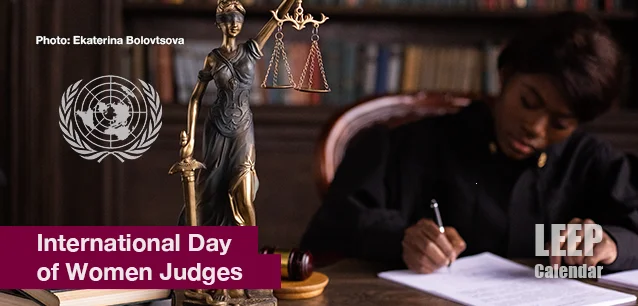 AD
AD
Today is: November 08
Scroll to explore events active on this date.
Additional Events on LEEP
LEEP INK FEATURES

August is Appropos
A toddler playing in the fountain at a park in Santa Fe, New Mexico—Photo LD Lewis. In August, we live through the Dog Days of Summer. It's hot and often humid, and those ...

September is Sassy
Can you hear that sigh of relief from parents worldwide? Yes! September marks the return of students to school, a global phenomenon. Preparations for the ACT and SATs begin earnestly for ...

OOH LA LA, October
October is the busiest month for events, with 5% more happening than in May, the second most eventful month. Sailing enthusiasts will be glued to the finals of this year's Am...
About the International Day of Women Judges
Legal , Women
Ends: Mar 10, 2025
DESCRIPTION:
Achieving Gender Equality through the Inclusion of Women Judges
The presence of women in the judiciary holds significant importance for various reasons. It not only guarantees that the legal system represents and considers the entire population but also encourages and empowers future generations of female judges to pursue their aspirations. Female judges within the criminal justice system can become catalysts for change, leading to increased accountability. By bringing diverse perspectives and experiences, they enhance the judicial system's overall strength. Women in leadership positions disrupt networks of collusion and combat corruption.
The representation of women in law enforcement and judicial institutions has been associated with more effective, victim-centric responses to crime. By supporting the development of women and female justice leaders, we can ensure that justice is delivered more effectively, and that all individuals in society, including women, experience fairness and equality under the law, ultimately benefiting everyone.
Active participation of women, on equal footing with men, in all decision-making levels, is crucial for achieving sustainable development, peace, and democracy.
Background
Historically, gender equality in the judiciary has been imbalanced, but efforts to address this issue are evident, as demonstrated by the United Nations General Assembly's declaration of March 10 as the International Day of Women Judges. The General Assembly resolution, proposed by the State of Qatar, signifies a positive shift in this direction.
Addressing gender inequalities is also central to UNODC's Strategy for Gender Equality and the Empowerment of Women, a goal shared by the Global Programme for the Implementation of the Doha Declaration. The program aims to foster a culture of lawfulness worldwide by offering education and training, and promoting the full participation of women across all professional fields.
VIDEOS
Currently, this event does not have supporting videos.
SUPPORTING DOCUMENTS
Currently, this event does not have supporting documents.
ADDITIONAL IMAGES
Currently, this event does not have supporting images.
Where would you like to go now?
 AD
AD


/footer-logo.svg)
